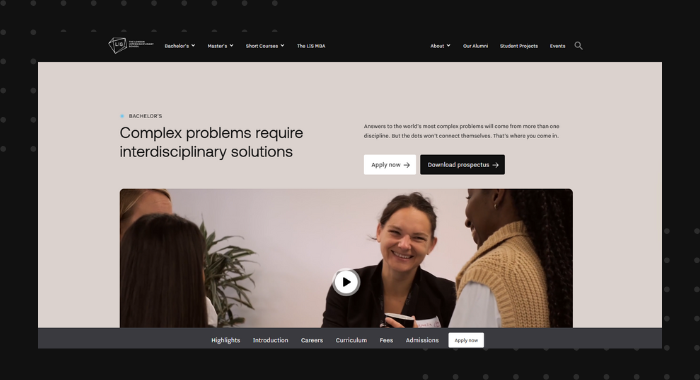What Can I Do With My Degree? BASc, MBA, and MASc Explained

If you’re considering studying for a BASc, MASc, or MBA degree or already have either of these qualifications but aren’t sure how they can propel your career, you’re in the right place. There are many career options to explore, depending on your goals and qualifications, and either of these programmes may be perfect to give you the training you need for your ideal profession.
LIS offers interdisciplinary BASc and MASc degrees to help students stand out in the workforce and personalise their learning experience. We aim to nurture a network of complex problem-solvers who have expertise beyond what traditional degrees allow.
This guide covers what BASc, MASc, and MBA degrees are, what they cover, and who they are ideal for.
Table of Contents
- BASc Degree
- MBA Degree
- MASc
- Why LIS to Get Your Degree and Excel in Your Studies
- Choose LIS to Get Your Degree
A BASc degree is an undergraduate degree focusing on practical skills and applied sciences. These programmes are typically for specialised fields such as technology or engineering. However, LIS’s BASc degree is unique in that it follows an interdisciplinary approach. Rather than students specialising in one subject, LIS’s degree exposes you to foundational skills in core areas, preparing you for various careers rather than one field.

Degree Length
A BASc degree is typically completed in three years full-time, comprising 360 credits. However, if you opt to study part-time, it can take four or five years to complete. Some degree programmes also offer the option of a work placement, which requires an additional year beyond the three years of study.
Subjects Covered
A BASc degree covers many different types of subjects, depending on the degree subject and what you want to pursue. However, if you don’t wish to have specialist knowledge in one field, LIS’s BASc degree covers a diverse range of quantitative and qualitative skills and expertise; these subjects include:
- Systems Thinking
- Data Science
- Machine Learning
- Close Reading
- Technology Ethics
- Data Studies
Entry Requirements
The specific entry requirements for a BASc degree vary depending on the university or college you attend and the programme you apply for. However, you typically need a strong academic background, such as A-Levels, BTECs, or equivalent qualifications. While these are traditional requirements, LIS offers a flexible admissions process that evaluates students on a case-by-case basis and considers work experience.
Earning Potential and Career Paths
There are many career pathways available to BASc students, depending on the subject knowledge covered in the programme and the field you wish to pursue. In the UK, BASc students earn around £40,000 per annum. Here are a few examples of career paths for BASc graduates:
- Financial Analyst: A financial analyst evaluates market trends and helps businesses make informed financial decisions.
- Sustainability Specialist: These professionals create and implement sustainability programmes within a company.
- ESG Consultant: Consultants advise businesses on optimising their ESG performance and setting benchmarks against industry standards.
- Software Consultant: A software consultant advises companies on selecting and implementing software solutions to optimise their operations.
- Social Worker: A social worker assists individuals and families in overcoming personal, social, and emotional challenges.
- Human Resources: Human resources professionals manage recruitment, employee relations, and organisational development to foster a positive work environment.
- Marketing Management: Marketing managers develop strategies to promote products, increase brand awareness, and drive customer engagement.
- Operations Management: Operations managers oversee daily business activities to ensure efficiency, productivity, and cost-effectiveness.

Who is the Degree Ideal For?
Students who are looking for a specialised, career-focused degree programme that is more practical than a general bachelor’s degree. These programmes are best if you don’t want to commit to a single major and enjoy a more diverse approach to undergraduate study. LIS’s BASc degree is the best solution for an interdisciplinary programme that helps you learn core problem-solving skills in critical areas, including data, programming, systems thinking, videography and photography.
An MBA is a management degree that traditionally prepares graduates for leadership roles in business. An MBA is the best option if you want to stand out in the business field and have a related undergraduate degree. However, if you're going to excel in business with expertise to think innovatively and understand how the world around you influences how organisations make strategic decisions, opt for LIS’s MBA.

Degree Length
Completing an MBA takes around one year of full-time study and two years if you want to study part-time. LIS’s MBA takes around 18 months to complete.
Subjects Covered
An MBA aims to equip students with the knowledge and skills they need to excel in business leadership. Going beyond traditional MBA content, LIS’s programme covers:
- Complexity: Identifying and representing systems, complex adaptive systems, and strategy and emergence.
- Energy: Sector implications of energy, transition finance and centralised versus decentralised energy.
- Intelligence: Sector impact of generative AI, task-based models of AI replacement and collective intelligence.
- Trust: Privacy and quality of user data, accounting transparency and measuring the insubjective.
- Ecosystems: Interrogating economic and ecological reasoning, governance of changes in complex systems and living systems approaches.
- Longevity: Models of demographic and generational change, risk management and human resources across the lifespan.
Entry Requirements
To be eligible for an MBA, you need a bachelor’s degree in a related field and several years of professional experience. To enhance your application, you should extend your academic qualifications with short courses, like the cross-functional leadership course by LIS. This course will help you understand how to manage teams across various departments, strengthening your leadership skills and proving your readiness to pursue an MBA.
Earning Potential and Career Paths
MBA students in the UK earn around £60,000 per annum, which is significantly higher than the average annual salary of undergraduate students. However, you can increase your salary with more work experience and academic qualifications. There are many fields that you can progress into with an MBA degree, including:
- Consulting & Strategy: Professionals help organisations adapt to fast-changing environments.
- Entrepreneurship: An MBA can prepare you for a career as an entrepreneur and for owning your own business.
- Impact Investing and ESG: You can work with environmentally oriented companies and align financial decisions with social impact.
- Corporate Innovation: Lead internal change in healthcare, education, and tech sectors.
- Accounting & Finance: MBA graduates in this sector can secure financial management, audit, or tax advisory roles.

Who is the Degree Ideal For?
An MBA degree is ideal if you hold a business degree or equivalent qualification and wish to pursue a career in finance, business, or a related field. Students who study these programmes should be passionate about helping organisations make strategic financial decisions and, in some cases, achieve sustainability.
A MASc degree is ideal for students interested in research, policy, or systems-level change. The LIS MASc programme helps students develop advanced research skills for policy and systems-level work. It blends quantitative expertise with applied problem-solving—perfect for those who want to bridge the gap between theory and practice.

Degree Length
A MASc takes around one to two years, depending on whether you study full-time or part-time. If you want to switch careers and have an unrelated bachelor’s degree, you may also want to consider taking conversion courses, which lengthen your time studying.
Subjects Covered
What your MASc degree covers depends on what degree you choose, but regardless of your choice, you’ll gain expert-level knowledge that positions you for leadership roles. LIS’s MASc degree covers interdisciplinary modules to help you become a complex problem-solver. With transferable skills, you’ll extend your career options, making it easier to switch to any field.
Here’s a glance at some examples of subjects covered in a MASc degree:
- Chemistry
- Physics
- Biology
- Business and Finance
- Psychology
- Environmental Science
- Computer Science
- Biomedical Science
Entry Requirements
To be eligible for a MASc degree, you typically require an undergraduate degree with a strong academic record in any field or academic discipline. Having extensive work experience and interest in research is ideal as these programmes are research-intensive. If you don’t have traditional academic qualifications but are ready for a MASc degree, LIS’s admissions team considers students from all backgrounds.
Earning Potential and Career Paths
The average salary for a master’s graduate is between £30,000 and £38,000 per year. With more work experience and qualifications, you can increase your earning potential. Many career options are available with a MASc degree, especially in the LIS programme, as you’ll have a wide range of critical expertise to pursue multiple pathways.
These are a few career paths for MASc graduates:
- Think Tanks and Research Institutes: MASc graduates have expert knowledge to shape conversations on everything from AI to urban planning.
- Public Policy: Professionals can inform government decision-making with evidence-based insights.
- Data Science and Analytics: Gain quantitative skills to pursue leadership roles in machine learning, data science and data analysis.
- Management Consulting: With master's level expertise, you can advise organisations on operational improvements and strategic issues.
- Economist: MASc graduates can analyse and forecast trends in international markets, conduct surveys, and collect data to help make economically sustainable decisions.
Who is the Degree Ideal For?
MASc degrees are ideal for students with strong academic and/or professional backgrounds and the analytical skills to cope with the research. A MASc degree is also an excellent option if you want to progress your skills to secure leadership roles or make a career switch.
At LIS, we don’t just deliver interdisciplinary degrees—we aim to help you build an interdisciplinary career. As a result, we have a unique approach to learning and offer various services to help you advance in the job market. Here’s an overview of why you choose LIS for your BASc, MASc or MBA degree.
Problem-First Learning
What’s unique about LIS’s degree pathways is that we focus on helping students apply interdisciplinary methods to become complex problem solvers in real-world settings. Unlike most degree programmes specialising in one topic, studying with LIS enables you to gain diverse quantitative and qualitative skills that prepare you to excel in any career.
Here’s an overview of what you can expect to learn in the BASc degree:
- Qualitative Methods 1A: Language and Communication - Understand close reading, thematic analysis, and participant observation.
- Quantitative Methods 1A: Thinking Like a Scientist - Develop foundational skills in coding, experimental methods and Fermi estimation.
- Problems 2A: Technology and Ethics - Learn technology ethics, data studies, and legal and political theory.
- Problems 2B: Urban Futures - Study architecture, prototyping, and project management.
If you’re interested in a master’s degree, these are the core modules you’ll study:
- Complexity: Gain insight into complexity in quantitative sciences.
- Integration: Learn how to achieve synthetic results through integration in theory.
You’ll also study four out of these five methods modules:
- Trials and Errors: How to read and think like a scientist
- Re:Form: Understanding and manipulating visual media
- Cracking the Code: Learning to programme
- The Right Word: Analysing and creating impactful language
- Everything Counts: Probability, statistics, and numerical estimation
To further personalise your learning experience, MASc students get to choose one problem elective:
- AI Futures: Technics, Ethics, and Aesthetics
- Designing for Life: Living Within Planetary Boundaries
- Acting Human: Cultural Technology and Human Action
Flexible Pathways
At LIS, we recognise that aspiring leaders and problem-solvers can come from diverse backgrounds, and our admissions process reflects this diversity.
Rather than taking a “one size fits all” approach, our interdisciplinary modules enable students to personalise their learning experiences based on their personal and professional goals. This is especially true for our MASc degree, as students can choose from various electives to gain the necessary knowledge. Graduate employers value students who know how to think critically and apply innovative solutions to complex problems.
We also have flexible solutions for you to pursue your studies, including full-time and part-time study options for MASc degrees:
Full-time MASc Degree Structure:
- On-campus learning
- One-year programme
- Five to ten live classes per week
- Self-paced online prep
Part-time MASc Degree Structure:
- Remote learning
- Eight to ten hours of classes per week
- Two to three hours of live workshops per week
- On-campus intensives per term
Career Support
One of our core resources for undergraduate and postgraduate study is career support. Whether you’re trying to break into specific specialised sectors or launch a successful career, we know it takes hard work. Students have access to a dedicated career mentor throughout their studies to help them understand how to stand out in the job market and make strategic career decisions.
We help every student build a professional identity and advance their career through these outcomes:
- Showcase your new and existing skills.
- Gain insights into career options that most align with your goals.
- Establish your career narrative.
While undergraduate students can also leverage this career support, they also have the added opportunity of paid internships, should they qualify. These Summer internships are for a minimum of five weeks and are designed to allow you to put your qualitative and quantitative skills to the test.
BASc, MASc, and MBA graduates have ample opportunities and can secure many jobs. If you have a strong academic background and extensive work experience, a graduate diploma or postgraduate degree, such as an MASc or MBA programme, is the perfect choice. These qualifications are ideal for students who want to study further subjects they are passionate about or want to make a career change.
On the other hand, a BASc degree works for students who need foundational skills to show potential employers they are workplace-ready. If you want to study with a flexible institution or have many career ideas and aren’t sure which one to pursue, LIS’s interdisciplinary approach is best for you.
At LIS, we equip students with transferable skills to become complex problem solvers. Instead of gaining specialist knowledge, you’ll learn how to apply innovative solutions to real-world scenarios.
Ready to pursue your career or start your academic journey? Contact LIS today.
Share this story
Sign up for our newsletter
Don't miss out on important updates including course information, new announcements, Open Day dates and the latest LIS news.

.png)












































.svg)

.svg)









.webp)
This is a comment related to the post above. It was submitted in a form, formatted by Make, and then approved by an admin. After getting approved, it was sent to Webflow and stored in a rich text field.